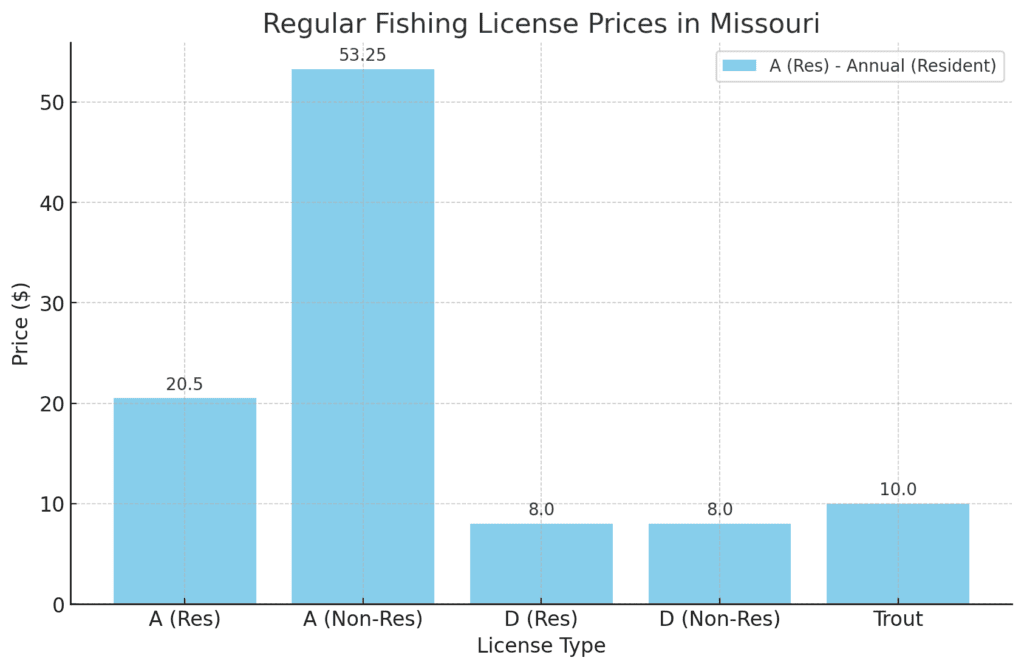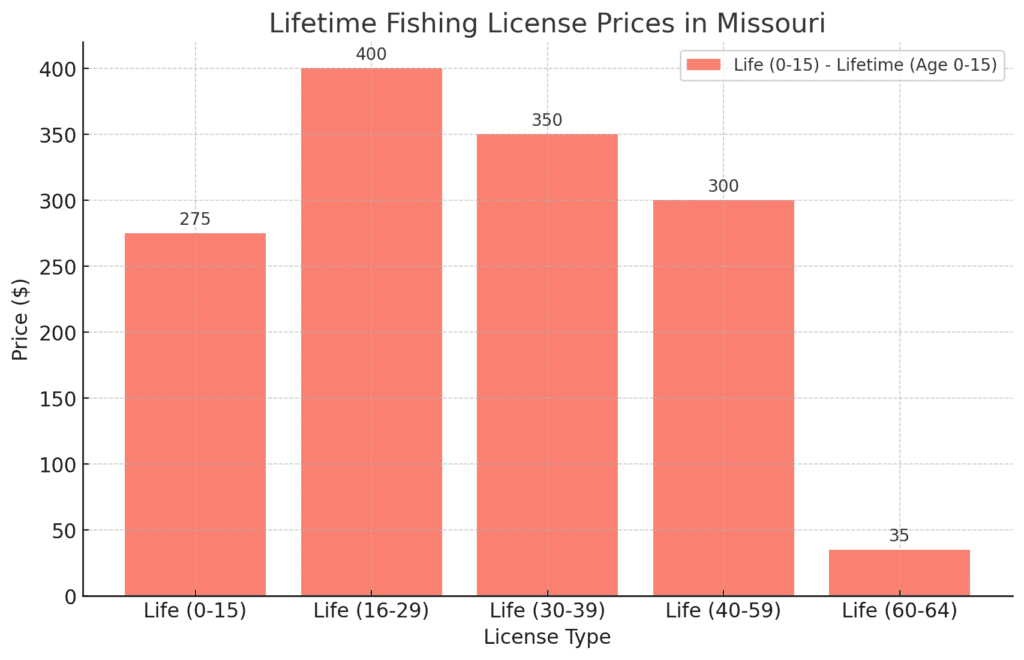If you’re planning to go fishing in Missouri, it’s important to familiarize yourself with the fishing license and permit requirements established by the Missouri Department of Conservation. Whether you’re a resident or a non-resident, obtaining the necessary permits ensures that you can enjoy the abundant fishing opportunities this beautiful state has to offer while also supporting conservation efforts.
Key Takeaways:
- Missouri residents require a fishing permit to fish in the state, with certain exemptions.
- The permit covers fishing for fish, frogs, mussels, clams, turtles, crayfish, and live bait.
- Additional permits may be needed for specific species like trout or migratory birds.
- License fees vary depending on residency and permit type.
- Permits can be purchased online, over the phone, at Department offices, or from authorized vendors.
Missouri Fishing License Requirements
To fish legally in Missouri, residents and non-residents must obtain a fishing permit from the Missouri Department of Conservation. This permit covers fishing for a variety of species, including fish, frogs, mussels, clams, turtles, crayfish, and live bait. However, it’s important to note that additional permits may be required for specific species such as trout or migratory birds.
The fishing permit requirements in Missouri are designed to both protect the state’s fish populations and ensure that anglers have a safe and enjoyable experience. License fees vary depending on residency and the type of permit you need. Missouri residents can expect to pay different fees compared to non-residents, and there are also separate fees for different permit types, such as daily permits or annual permits.
Fishing Permit Types
The Missouri Department of Conservation offers a range of fishing permit types to suit different angler needs. These include daily permits, annual permits, and even lifetime permits for those who plan to fish in Missouri for many years to come.
Permit Types:
- Daily Permit
- Annual Permit
- Lifetime Permit
It’s important to check the Missouri Department of Conservation website or contact their offices for the most up-to-date information on fishing permit requirements and license fees. This will ensure that you have the correct permit and pay the appropriate fee for your fishing activities in Missouri.
“To fish legally in Missouri, residents and non-residents must obtain a fishing permit from the Missouri Department of Conservation.”
Types of Fishing Permits and License Fees
The Missouri Department of Conservation provides a variety of fishing permits and licenses to meet the needs of different anglers. Whether you are a Missouri resident or a non-resident, there is a suitable permit option for you to enjoy fishing in Missouri’s rich waters.
Resident Permits
If you are a Missouri resident aged 16 to 64, you will need a fishing permit. Residents aged 65 and above can opt for a lifetime fishing permit. The available permits are:
Annual Fishing Permit
- Cost: $20.50
- Details: Allows fishing in Missouri’s abundant waters for one year.
Annual Fishing Permit (Age 60-64)
- Cost: $12.00
- Details: Discounted annual permit for residents aged 60 to 64.

Lifetime Fishing Permits
These permits provide a long-term fishing option with different prices based on age groups:
| Age Group | Cost |
|---|---|
| Youth (0-15) | $275 |
| Age 16-29 | $400 |
| Age 30-39 | $350 |
| Age 40-59 | $300 |
| Age 60-64 | $35 |

Non-Resident Permits
Non-residents can purchase either annual or daily fishing permits depending on the duration of their stay.
Annual Fishing Permit
- Cost: $53.25
- Details: Allows non-residents to fish in Missouri waters for one year.
Daily Fishing Permit
- Cost: $8.00
- Details: Allows non-residents to fish for a single day.
Trout Permit
For those interested in catching trout, a trout permit is required in addition to the regular fishing permit. This permit is necessary for fishing in designated trout areas and is available to both residents and non-residents.
- Cost: $10.00
- Details: Required for fishing in Missouri’s trout parks, streams, and lakes where trout are stocked.
Summary of Fees
Here is a comprehensive table summarizing the fees for various fishing permits in Missouri:
| License Type | Resident Fee | Nonresident Fee |
|---|---|---|
| Annual Fishing | $20.50 | $53.25 |
| Annual Fishing (Age 60-64) | $12.00 | Not available |
| Daily Fishing | $8.00 | $8.00 |
| Trout Permit | $10.00 | $10.00 |
| Lifetime Fishing Permit – Youth (0-15) | $275 | Not available |
| Lifetime Fishing Permit – Age 16-29 | $400 | Not available |
| Lifetime Fishing Permit – Age 30-39 | $350 | Not available |
| Lifetime Fishing Permit – Age 40-59 | $300 | Not available |
| Lifetime Fishing Permit – Age 60-64 | $35 | Not available |
Additional Permits and Options
The Missouri Department of Conservation also offers several other permits to enhance your fishing experience:
Paddlefish Permit
Required for those looking to catch paddlefish.
Urban Fishing Permit
Needed for fishing in designated urban areas.
Commercial Fishing Permit
For individuals engaged in commercial fishing activities.
It’s important to note that some permits have specific regulations and requirements. Always familiarize yourself with the details before heading out on your fishing adventure.
By obtaining the necessary fishing permits and adhering to regulations, anglers can contribute to the sustainability of Missouri’s fisheries while enjoying the state’s abundant natural beauty.
For the most up-to-date information, visit the Missouri Department of Conservation’s official website here.
Rules and Regulations for Fishing in Missouri
To ensure sustainable fishing and protect the state’s aquatic resources, the Missouri Department of Conservation has established rules and regulations that anglers must adhere to. These regulations are in place to maintain healthy fish populations, preserve natural habitats, and promote responsible fishing practices.
When fishing in Missouri, it is important to be aware of size and quantity limits for different species. These limits are put in place to ensure that fish populations can thrive and reproduce. Anglers must also adhere to seasonal restrictions, as certain species may have specific fishing seasons or closed periods to protect their breeding cycles.
In addition, there are specific location restrictions in Missouri to protect sensitive ecosystems and reduce overfishing in certain areas. Some bodies of water may have catch-and-release policies or designated areas where fishing is prohibited. It is crucial for anglers to familiarize themselves with these restrictions and avoid fishing in restricted areas to avoid penalties or fines.
| Regulation | Description |
|---|---|
| Size and Quantity Limits | Restrictions on the size and amount of fish that can be kept |
| Fishing Seasons | Designated periods when certain species can be caught |
| Location Restrictions | Prohibited areas or catch-and-release policies to protect ecosystems |
The Missouri Department of Conservation website is a valuable resource for anglers seeking detailed information on fishing regulations. The website provides a comprehensive guide to fishing rules and regulations, including specific regulations for different bodies of water and species. Anglers can also find information on permit requirements, fees, and exemptions, as well as updates on any changes or new regulations that have been implemented.
Conclusion
Fishing in Missouri, with its vast and diverse fishing opportunities, starts with securing a Missouri fishing license from the esteemed Missouri Department of Conservation. Whether a Missouri resident or non-resident, all need to buy a fishing permit to cast a line in Missouri waters, though several exemptions do apply.
From the clear waters of the Mississippi River to the expansive shores of the Missouri River, the state offers types of fishing experiences like no other. There are daily fishing permits for those looking for a quick fishing jaunt, and for those visiting places like trout parks, you might need to purchase a daily trout fishing tag or trout permit. Anglers hoping to enjoy the free fishing days won’t need a license, but it’s paramount to have the right permit for places like Lake Taneycomo and the vicinity of the Highway 65 bridge.
For the dedicated angler, lifetime permits, such as the lifetime fishing permit and the lifetime conservation partner permit, are available. These carry the same privileges as the resident hunting and fishing permit, a testament to the state’s commitment to lifelong hunting and fishing. Small game hunting and fishing are also popular activities, with specific permits available, including the hunting and fishing permit order form. Commercial endeavors, like shovelnose sturgeon fishing, require particular attention to regulations, so always check before setting out.
You can get a Missouri fishing license online, or from permit vendors across the state. The Department of Conservation offices and the free MO fishing app are indispensable resources, providing comprehensive details on everything from fishing etiquette to gear restrictions. With species ranging from trout to turtles, and clams to mussels, anglers must equip themselves with the right fishing gear, such as snares.
Special permits like the trout permit for areas near Table Rock or the conservation order permit for specific activities add to the range of fishing experiences. The state also boasts programs like the warrior transition brigade and warrior transition unit, acknowledging the service of those at military medical centers. For residents, privileges such as the resident fishing or the resident hunting and fishing permit are available, with the latter carrying the same privileges as the resident hunting permit.
Missouri residents who are currently prisoner of war or honorably discharged, and those with evidence of a Missouri I-551 resident alien card, have specific provisions, ensuring everyone can enjoy the state’s fishing offerings. The conservation department emphasizes the importance of fishing skills, proper fishing etiquette, and respecting rules and regulations defined in Missouri revised statutes. This ensures the preservation of Missouri’s rich aquatic life, from the fish in Missouri to the live bait essential for angling.
In wrapping up, Missouri, with its fishing areas and conservation permit card provisions, stands as an angler’s paradise. So, whether you’re gearing up for light goose conservation order activities or just looking to enjoy fishing on the serene waters of Lake Taneycomo, remember to carry your fishing permit order form, and perhaps even a federal duck stamp if you’re birdwatching too. Every angler, from those using simple fishing gear to those with a lifetime hunting and fishing permit, contributes to the state’s rich fishing tapestry.
Frequently Asked Questions (FAQs) about Fishing in Missouri
- What is a Missouri fishing permit?
- A Missouri fishing permit is an official document issued by the state that grants permission to individuals to fish within Missouri’s waters.
- When must one purchase a fishing permit in Missouri?
- Anyone planning to fish in Missouri’s public waters must purchase a fishing permit unless they fall under specific exemptions.
- Is the Missouri fishing permit available online?
- Yes, the Missouri fishing permit is available online through the official website of the Missouri Department of Conservation.
- What is a lifetime trout permit?
- A lifetime trout permit is a special permit available for purchase that allows the holder to fish for trout for their entire life without needing to renew the permit annually.
- Who qualifies as immediate household members for a fishing permit?
- Immediate household members typically refer to individuals living at the same residence, such as spouses and dependent children.
- Can I fish if I’m accompanied by a licensed angler but don’t have a permit myself?
- Generally, all anglers need their own permit. Being accompanied by a licensed angler does not exempt you from needing your own fishing permit.
- What is visual concentric contraction, and how does it relate to fishing in Missouri?
- Visual concentric contraction is a specific eye condition. In some states, individuals with certain disabilities, including visual impairments, might be eligible for exemptions or discounts on fishing permits.
- Are there days when I can fish without a license in Missouri?
- Yes, Missouri occasionally has “Free Fishing Days” where anglers can fish without a license. However, other regulations and limits still apply.
- How can I use the lifetime hunting and fishing permit?
- The lifetime hunting and fishing permit allows the holder to hunt and fish in Missouri without needing to purchase annual permits. It’s a one-time purchase that covers both activities for the holder’s lifetime.
- Where can I purchase a fishing permit in Missouri?
Fishing permits are available online or from permit vendors across the state, including some sporting goods stores and local Department of Conservation offices. - Are there penalties for fishing without a valid permit?
Yes, fishing without a valid permit can result in fines and other penalties as it’s a violation of state regulations. - Is there a reduced cost for fishing permits for certain groups?
Yes, there are reduced cost permits available for seniors, veterans, and other specific groups. Check with the Department of Conservation for eligibility criteria. - Do I need a trout permit even if I have a general fishing permit?
Yes, if you intend to fish for trout in specific waters or during certain seasons, you’ll need a trout permit in addition to your general fishing permit. - What’s the difference between a resident angler and a non-resident angler?\
A resident angler is someone who resides in Missouri and meets the state’s residency requirements. Non-residents are individuals from outside Missouri. The fees and regulations might differ between the two groups. - Is the date of purchase important for my fishing permit?
Yes, the date of purchase indicates the start of the permit’s validity. Most permits are valid for one year from the date of purchase, unless otherwise specified.

